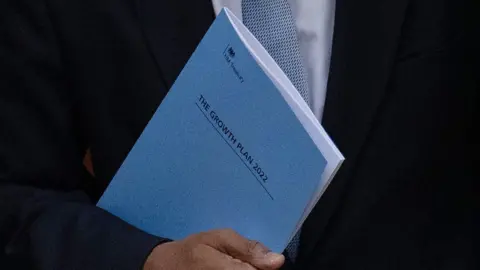Faisal Islam: Kwarteng sent stinging and unusual rebuke by IMF

 Getty Images
Getty ImagesThere is a lot that is remarkable about Britain's financial situation right now.
Home movers telling us that between the mini-budget and today they had already lost multiples of their stamp duty savings, from massive increases in mortgage costs.
Importers facing invoices increasing by thousands of pounds, which are worth little more than a dollar.
The movements up and down by half a percentage point in the effective borrowing cost for British government debt are incredible.
A sterling slump starting during a budgetary statement is the great terror the Treasury always fears, but never actually happens. Until now.
But even I was taken aback by the interjection of the International Monetary Fund (IMF) in its direct, uncompromising, unflinching and somewhat humiliating criticism of the government's fiscal plan.
Not only did the world's most important international financial institution suggest the plan was economically risky, it said it was likely to increase inequality and recommended taking an "early opportunity" for a re-evaluation of the policies in the coming weeks, on a specific date.
The criticism came as Chancellor Kwasi Kwarteng reiterated he was sticking to a plan only outlined four days ago.
The stinging rebuke from the International Monetary Fund reflected similar concerns from the world's major finance ministries that a crisis brewing in the UK could spill over into a global slowdown.
The criticism from the Washington-based body was without a clear precedent in regard to a major G7 country and shareholder.
UK developments are being "closely monitored", it said. It warned "untargeted fiscal packages" were not recommended at a time of high inflation.
While this was not any type of 1976-style bailout conversation, it is the sort of warning the IMF more typically makes to emerging economies.
The IMF is the lender of last resort to nations in financial crises, and one of its key functions is to survey the international economic system for early warning signs of problems.
These warnings echo an expectation in Whitehall that the government is now in a process of evaluation of its tax plan and borrowing numbers, by forecasters and the Bank of England, that will, in time, lead to a reversal on the tax plan or significant spending cuts.
The interest rate shock continues to be pushed across the economy through mortgages and corporate loans, increasing the cost to the public finances and the economy.
The IMF's words sparked anger from some supporters of Prime Minister Liz Truss, who pointed to a lack of criticism of the massive fiscal spending of the US Biden administration.
Others made familiar attacks on the organisation's leader, Kristalina Georgieva, who used to be a European commissioner.
But the concerns do reflect public comments made by finance ministers and central bankers across the G7, and market traders too.
There are fears that if an advanced country can see a currency slide and an extraordinary unforced surge in borrowing costs, that markets may start to seek out vulnerabilities in other similar countries too.

- A TWISTED COMEDY TREAT: The news remixed as you’ve never heard it before
- TAKE A BREAK: How to boost your mood by simply stopping work for a moment!

